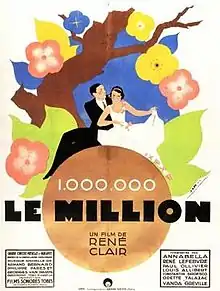Le Million
Le Million is a 1931 French musical comedy film directed by René Clair.The story was adapted by Clair from a play by Georges Berr and Marcel Guillemand.
| Le Million | |
|---|---|
 Theatrical release poster | |
| Directed by | René Clair |
| Produced by | Frank Clifford |
| Screenplay by | René Clair[1] |
| Based on | a play by Georges Berr and Marcel Guillemaud[2] |
| Starring | Annabella René Lefèvre Jean-Louis Allibert Paul Ollivier |
| Music by | Armand Bernard Philippe Parès Georges Van Parys |
| Cinematography | Georges Périnal |
Production company | Tobis Sound Company[1] |
Release date |
|
| Country | France[1] |
| Language | French |
Plot
While being hounded by creditors, a debt-ridden artist discovers he has just won a lottery worth a million Dutch florins. Realizing that he has left the ticket in the pocket of his jacket, he attempts to retrieve it but discovers that his fiancée Beatrice has given away the jacket to a criminal in order to elude the police. He and his rival race to retrace the jacket which has passed to a brigand nicknamed "Grandpa Tulip" and then to a tenor singing "Les Bohémiens" at the opera theater that night.
Michel, arriving at the theater following a stint at the local jail, and Beatrice engage in a madcap chase through the theater as they endeavor to regain the ticket; during the chase the jacket flies out the window onto the top of a car. Fearing he has lost the ticket for good, Michel gets into the taxi of one of his creditors, only to find the sleeve of the jacket hanging in front of the window. After stopping the cab to remove the jacket from the top of the car, his attempt to search for the ticket in the pocket is thwarted by associates of Grandpa Tulip, who force him to hand over the jacket. Leaving dejected, he returns to his apartment to find his creditors in good spirits, as they think that they will be repaid. Before he gives them the bad news, Tulip enters the apartment with a jacket. Thinking that this is his original jacket, Michel searches the pockets. Finding them empty, he tells Tulip that he actually wanted a ticket in the pocket, which Tulip subsequently produces, having taken it out of the jacket before giving it away.
Cast (in credits order)
- Annabella as Beatrice
- René Lefèvre as Michel Bouflette
- Jean-Louis Allibert as Prosper
- Paul Ollivier as Granpere Tulipe
- Constantin Siroesco as Ambrosio Sopranelli
- Raymond Cordy as Le Chauffeur De Taxi
- Vanda Gréville as Vanda
- Odette Talazac as La Cantatrice
- Pedro Elviro as Le Regisseur
- Jane Pierson as L'Epiciere
- Andre Michaud as Le Boucher
- Eugene Stuber as Le Policier
- Pierre Alcover as Le Policier
- Armand Bernard as Le Chef D'Orchestre
- Gabrielle Rosny
- Georgette Dalmas
- Jean Gaubens
- Teddy Michaud
- Louis Musy
- Louis Pre Fils
- Georges Zwingel
- Edouard Francomme
- Franck Maurice
- Henri Kerny
- Gustave Huberdeau
- Allan Durant
Production
Le Million was director René Clair's second sound film. Initially, he had been skeptical of the value that sound would bring, saying that it was "an unnatural creation, just useful for canned theater." He detested the other sound films of the day and their dedication to the slavish dialogue. He would change his feelings when he realised that he could also apply a soundtrack to a film, a strategy he used in Le Million, three years after the first sound film was released.[3]
Release
Le Million was released in France on 15 April 1931.[1]
Critical reception
Paul Sherman of the Boston Herald described the film as "lively and down-to-earth".[4] Jeremy Heilman of Movie Martyr says that the "sophisticated use of the fledgling (sound) technology led to universal acclaim for the director, who became regarded as the first true master of the sound film."[4] The eminent New Yorker film critic Pauline Kael lavished praise on the film: "René Clair at his exquisite best; no one else has ever been able to make a comedy move with such delicate, dreamlike inevitability … This movie is lyrical, choreographic, giddy--it's the best French musical of its period."[5] Elliot Stein of Criterion calls the film "a synthesis, a perfect fusion of sound, dialogue, camera placement and editing. The mood may be ironic, sad or happy, but music and song are never far away."[3]
References
- "Le Million (1930) René Clair" (in French). Bifi.fr. Retrieved 17 December 2016.
- "Le million". Criterion Collection. Retrieved 17 December 2016.
- Stein, Elliot. "Le Million". The Criterion Collection. Retrieved 24 April 2012.
- "Film Notes". State University of NY. New York State Writers Institute. Retrieved 24 April 2012.
- Kael, Pauline (1991). 5001 Nights at the Movies. New York: Henry Holt. p. 481. ISBN 0-8050-1367-9. Retrieved 24 May 2018.
External links
- Le Million at AllMovie
- Le Million at IMDb
- Le Million at Rotten Tomatoes
- Le Million an essay by Elliott Stein at the Criterion Collection